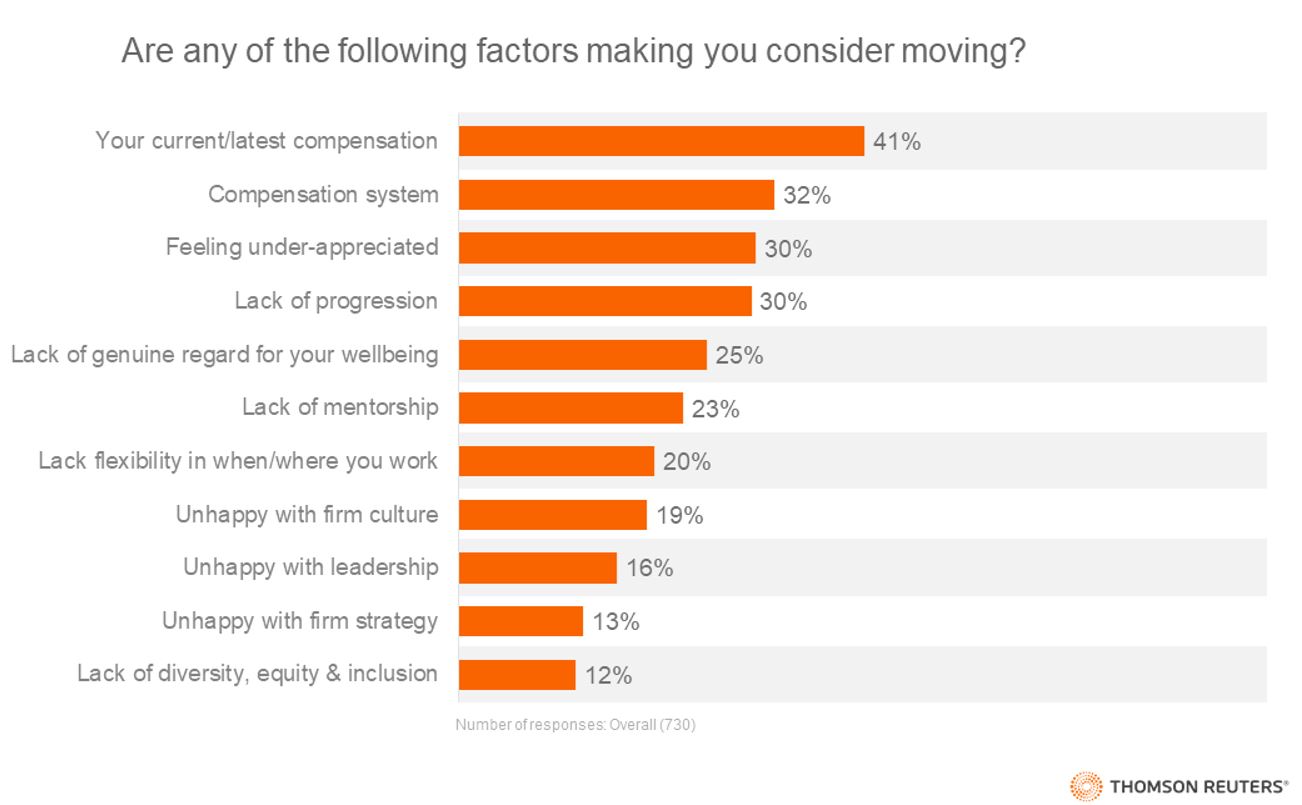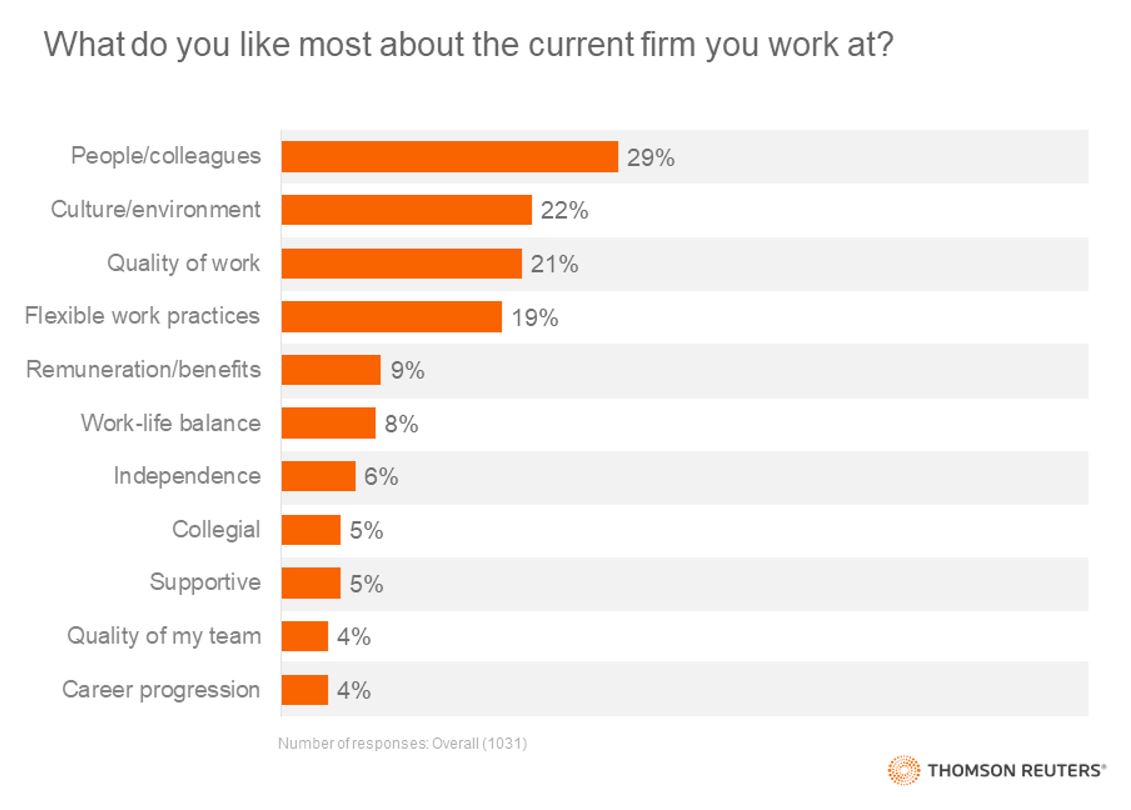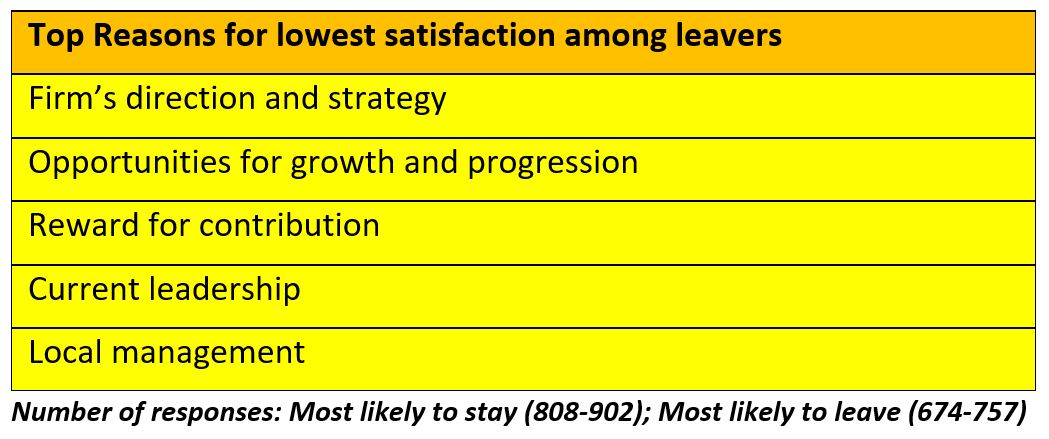While much has been written about the red-hot market for legal talent and the dismal rates of attrition among law firm associates, little chatter has addressed the reasons why associates are switching firms in record numbers
Almost half (46%) of new associates said they are seriously thinking about moving to a different firm, according to a recent Thomson Reuters survey of more than 1,500 associates. This “seriously thinking” comes with a huge cost to law firms as even the loss of a single associate is estimated to be upwards of $400,000, and that doesn’t include the cultural ramifications for firms of losing future leaders or potentially high-powered partners. So, the question then becomes a critical one: What is causing associates to leave?
While the Thomson Reuters Stellar Performance global talent study identified key reasons lawyers are most likely to stay or leave their current firm, in the just-published Law Firms Stay-Go Report 2022, from the Thomson Reuters Institute and the Center on Ethics and the Legal Profession at Georgetown University Law Center, we went after this question of why they leave or stay. To that end, we surveyed associates to better understand what would cause an associate to stay or leave, and what they liked most — or least — about their current law firm.
Among those associates likely to leave their current firm, compensation, unsurprisingly, was the first criteria they cited that would influence their decision. However, the next highest-rated factors are intriguing. Associates noted that feeling underappreciated, experiencing a lack of career progression or a lack of genuine regard for their well-being were all top factors in any decision to leave their firm, being cited third, fourth, and fifth, respectively.
Clearly, this leaves those law firms that are experiencing a high level of associate attrition to carefully look inward and see whether these negative factors exist at the firm and what firm leaders can do to alleviate these flight risks. Indeed, as the report makes clear, financial sustainability may depend on how firms address the retention issue.

On the flip side, what do those associates who want to stay at their current firms like most about where they work? In this case, interestingly, compensation is ranked fifth, indicating these satisfied associates view several other reasons as more important influences on their decisions to stay at their firms. For example, the top two reasons cited by these associates were the people with whom they work, and the culture or environment within the firm.
This insight raises a number of vital questions for law firms going forward. For example, as firms begin to navigate how best to loosen their pandemic-related restrictions, they need to be mindful that their future leaders have indicated that they value the people and the cultural aspects of their firms along with the quality of work they do and the opportunity for flexible work practices. Further, it also raises the question of whether firm culture is dependent on physical location. Now that it’s a near-certainty that a mix of remote and in-office work will be the future of the legal profession, how can firms build an intangible set of collective beliefs, values, and attitudes while their lawyers work in a hybrid environment?
It would be wise here too, to remind law firms and their leaders of the old saw of babies and bathwater. Offering quality work to your lawyers — providing good instructions and important matters upon which upcoming young talent can work — is not achieved by shifting the firms’ focus of looking after clients to looking after talent. Firms need to mesh the two strategies together so that each is working in tandem for the advantage of the other. Having the right talent in your firm will keep clients happy and loyal and is proven to increase your firm’s share of wallet through collaboration efforts.

As our data clearly shows, for the associates planning on staying at their current firm, the highest levels of satisfaction is driven by how fairly they are treated and how much they are shown respect by their current firms. On the other hand, associates who said they are most likely to leave cited a lack of opportunities for career growth, problems with the firm’s direction or strategy, unhappiness with the firm’s current leadership, and compensation as the top reasons driving their low satisfaction.

As the war for talent rages on, law firms need to form a strategy that does not use compensation as the singular lever to retain top talent. As was discussed in great depth during our recent Insight Council event earlier this month, raising compensation is a “short-term” solution to talent retention, and a highly risky one at that.
Those progressive law firms that look towards the other important and often longer-term pull levers that not only retain associates but create a strong and enduring culture in the “new normal” are the ones that will survive and flourish going forward. And if that talent retention strategy is well-executed, it can do more than just attract high-caliber talent, it can also boost a firm’s brand reputation and stabilize and grow its bottom line.







